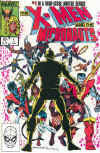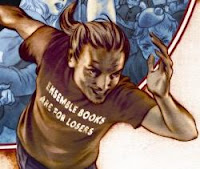by Brandon Here is the second installment of the series that examines the who, what, when, where, why and how of comic book collecting essentials. Last week, I literally took a cerebral look at the reason why we read comic books. This week, I look at a more grounded approach to why we fancy the funny books.
Here is the second installment of the series that examines the who, what, when, where, why and how of comic book collecting essentials. Last week, I literally took a cerebral look at the reason why we read comic books. This week, I look at a more grounded approach to why we fancy the funny books.
Do you know why you read comic books? You probably don’t think about it too much. You just pick up your books and enjoy them. Nothing more, nothing less. Right? But that’s why the fine people at this blog pay me the big bucks to do your thinking for you! Or is that Fox News? No matter, I hope to offer some more insight into this “why we read” question this week.
Editor's note: We pay Brandon in wookie porn.
Our individual learning styles aside, comic book collecting inspires very a fanatical fan base. I don’t want that to sound like a negative, that comic fans are militant or narrow-minded when it comes to our hobby. Something about comics books attract us to the medium. One of the most often quoted reasons is the escapism. Many say that comic books offer some form escapism for its readers. I don’t necessarily buy that reason hook, line and sinker. While I believe many do like the fantastical distraction comic books can provide from the curmudgeonly world we populate, I just don’t buy it as a viable reason for the success of the medium. If people are looking for an escape, they will find one whether they have an issue of Detective Comics sitting in front of them or not.
Here are five more reasons why I think people read comics beyond their brain:
1) Unique Format
2) Diversity
Despite the perception of comic books as being one large superhero sausage party, there is quite a diverse range of titles available for readers out there. It is true that our market is dominated by the superhero genre. Looking at Diamonds top 100 sellers for the month of April 2008, I counted a total of ten titles that I would consider to not be in the superhero genre. Does that mean we all read superhero comics? Well, to a degree, I think the answer is yes. Does that mean all comic books are superhero comics? Absolutely not. If you flip through a copy of Previews, you will see a wide variety of non-superhero titles from all companies, not just the indie publishers. The diversity beyond superheroes is out there, and I think people would find titles they'd like if they would just look for them. Historically speaking, this medium has serviced the superhero quite well. But just because one genre is at the forefront doesn’t mean that there is no diversity in superhero books. Heavens no! There are so many books out there to try that if you can’t find a comic book you like, you are either an unhappy person who should probably leave the medium or you just hate America, Jesus, and Coca-Cola. The challenge for comic companies is to be fresh when presenting content. Many people think comics never change. While there may be some degree of merit to that argument, comic books routinely need to change in order to keep us interested!
3) Continuity Uh oh. The “C” word. Continuity is second only to the word “Liefeld” in generating heated debate within our community. Love it or hate it, continuity keeps us coming back time and time again to read our favorite titles. The very continuing nature of this medium speaks to its uniqueness. How many fictional TV shows can say they have been plugging along for forty or fifty years? Comic books place us, the ever inquisitive fans, in the position of always asking "what’s next?" For better or worse, we are afforded that opportunity around twelve times a year for as long as people continue to buy the comic. We like making connections to past story lines we have read because it makes our interest and understanding of the character stronger. Hey, remember that time the X-Men teamed up with the Micronauts? That was intense! Okay, so maybe it wasn’t, but we like making those connections and strengthening our bond with the title characters. Continuity allows us to do just that. Now, if only continuity would make Avengers fans love the New Avengers, the world would be a better place.
Uh oh. The “C” word. Continuity is second only to the word “Liefeld” in generating heated debate within our community. Love it or hate it, continuity keeps us coming back time and time again to read our favorite titles. The very continuing nature of this medium speaks to its uniqueness. How many fictional TV shows can say they have been plugging along for forty or fifty years? Comic books place us, the ever inquisitive fans, in the position of always asking "what’s next?" For better or worse, we are afforded that opportunity around twelve times a year for as long as people continue to buy the comic. We like making connections to past story lines we have read because it makes our interest and understanding of the character stronger. Hey, remember that time the X-Men teamed up with the Micronauts? That was intense! Okay, so maybe it wasn’t, but we like making those connections and strengthening our bond with the title characters. Continuity allows us to do just that. Now, if only continuity would make Avengers fans love the New Avengers, the world would be a better place.
4) Amenable to Fan Feedback
Comic books have always been about the fans to a large degree. Despite what His Holiness Joe Quesada tells you, I think we fans have an unprecedented impact on the medium in this day and age. Back before Al Gore and Bill Nye the Science Guy created the Internet, letter pages brought fans closer to the creators of the books we read. Raise your hand if you have had a letter published in a book....don’t be shy. I have! Wasn’t that an amazing feeling? You bet your black-bagged Death of Superman it was! Nowadays, the Internet makes an even closer connection possible. It also has the danger of isolating fans even more. The letter pages have made a slow comeback in some books, whereas they have all but disappeared in others. Fans now have to go online to badger their favorite creators. This isn’t necessarily a bad thing, but the impersonal and sometimes nasty nature of the Internet can turn some creators away. At this point, I think the Internet is more positive than negative in the fan feedback column, but I have my doubts on the long-term impact of fan feedback via the Internet as long as every Newsarama poster begins each thread with, “first post.”
5) Comics Inspire Loyalty
Whew. Next week, I’ll return for my third article in this series. I plan on exploring the “what we read” question then.
5.30.2008
Panelology – Why We Read (Part 2)
Labels:
Brandon; panelology,
Chuck Austen,
Continuity,
Fables,
Jack of Fables
Subscribe to:
Post Comments (Atom)





6 comments:
Good Stuff Brandon. But I think When you said "Comics Inspire Loyalty" you really meant "Comic Inspire Obsessive Compulsive Disorder."
What book did you get your letter published in?
I never got one of my letters published. I only wrote one though and it was to Alpha Flight.
I've had a few published. I have had two published in some issues of Stray Bullets. Another in a issue of an Andi Watson book. I also had one published in one of the Star Wars comics, I believe it was KOTOR.
Star Wars eh? That is pretty cool! You'd think that I would have got my letter published in Alpha Flight since it was such a popular title. :)
Don't get me started on Alpha Flight. I'll never shut up!
But seriously, I've actually wanted to check out Alpha Flight via the bargain bins. I'm planning on doing a column soon on bargain buying, so I might use my AF search as a template.
Those early Alpha Flight comics are really good. You should check it out.
Post a Comment